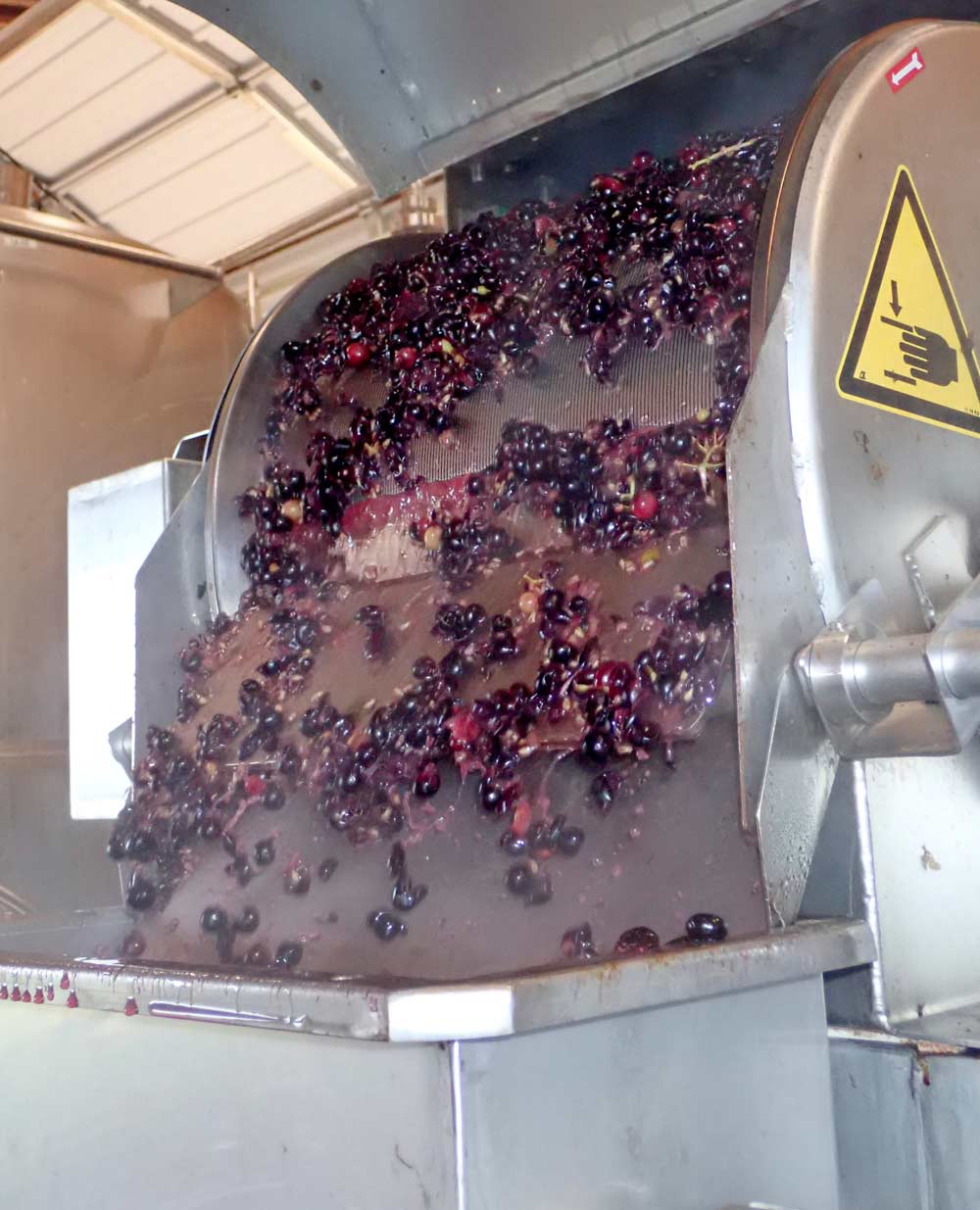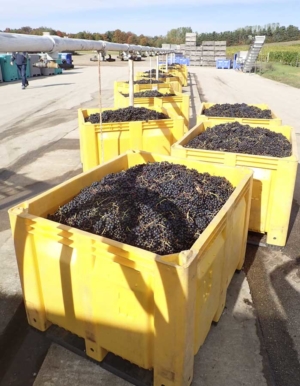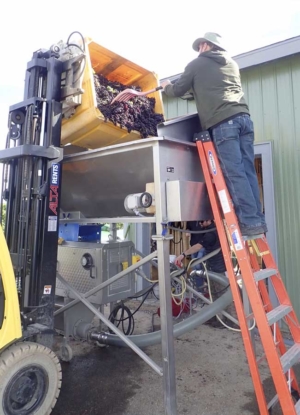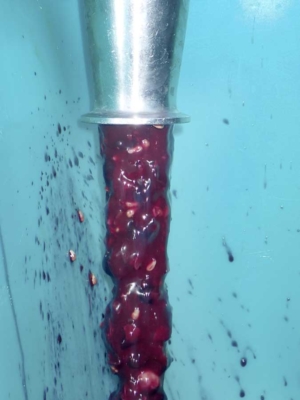
Black Star Farms’ new flash détente system uses a heating and cooling process to enhance red grapes’ good qualities while removing detracting characteristics. During the heating phase, fruit pulp separates from the juice. The slow heating and rapid cooling process have concentrated the color, tannins and sugar in these grapes, while removing detracting characteristics, including the vegetal taste that is common in fruits that have not achieved their full ripeness. Photo by Leslie Mertz
On a picture-perfect October day in northwestern Lower Michigan, a grape-hauling truck rumbles down a dirt road toward a steel-sided building sitting amid a vineyard. About the size of a four-car garage, the building houses a new processing technique that might just give the state’s red wines the boost they need to be more competitive.
“We’re making what I think are some of the best white wines in the world here in Northwest Michigan, and they’re making nice white wines in the southern part of the state as well.
Now we want to see if we can enhance the red wine side of things a little bit,” said Lee Lutes, winemaker at Black Star Farms in Suttons Bay, Michigan.

Vineyards and wineries from throughout the state are welcome to use the system. Here, a load of red grapes from French Road Cellars winery is waiting to be put through the flash détente system. (Photo by Leslie Mertz)
That’s where the new processing technique comes into play. It is the Great Lakes region’s first flash détente system, and it involves heating and cooling the fruits before fermentation as a way to enhance the grapes’ favorable attributes while removing detracting ones.
Although flash détente is widely employed in Europe, South America and Australia, only a dozen such systems are in use in the United States, and most of those are in large-scale vineyard operations in California.
Black Star Farms’ system is a Della Toffola version that caters to small producers, processing up to 5 tons per hour. For this first year, Black Star Farms is charging vineyards a discounted rate of about $150 a ton to process their fruit.
“To give you an idea of the discount, they’re charging somewhere between $350 to $450 a ton to process the fruit in California,” he said. Even at the higher rate, that equates only to about 40 to 45 cents per finished bottle of wine. “If it makes the wine that much better, it’s really a marginal cost.”
Into the red
Reds can be difficult in Michigan mainly because of the weather. In some years, red grapes struggle to fully ripen.
In wet years, they can accumulate methoxypyrazines, which can confer a vegetable taste, often described as green bell pepper or asparagus, to the wine. “We had a couple of challenging years in 2014 and 2015, so I was trying to look at alternative technology that might help, and flash détente was something that kept coming up,” Lutes said.

Red grapes are poured into a hopper for initial destemming and crushing before going into the flash détente system. (Photos by Leslie Mertz
Black Star Farms applied for and received a $210,000 grant from the Michigan Department of Agriculture and Rural Development to help purchase the approximately $500,000 system, installed it over the summer, and began inviting vineyards from throughout the state to give it a try with their 2017 harvests.
The flash détente process begins with destemming and crushing the grapes and pumping them into a machine that separates the juice from the pulp.
The juice and the crushed grapes go into separate heating chambers where they are warmed slowly to between 170 and 195 degrees based on the grapes and the desired outcome.
The heating process kills any microbial populations that may have come in from the vineyard, so it removes things like fungus, rot and other organisms that can contribute to spoilage and affect a wine’s quality, Lutes said.
“When we make wine normally, we put it through the crusher and add yeast to it for fermentation, but the yeast takes a while to really take off, and in that first 48 to 72 hours, those microbes can start to degrade the fruit, which can also degrade the wine. In this flash détente process, you’ve eliminated those microbes, so you’re getting a cleaner fermentation and a purer expression of the fruit.”
Methoxypyrazines and other offensive compounds in some varieties are eliminated in this heating stage, which consequently removes unpleasant vegetable tastes and odors.
The next step in the flash détente system is the “flash” phase. The juice and grape pomace are mixed together at desired rations and go into a vacuum tank that provides rapid cooling under negative pressure.
“Here, the cell structure of the grape skins rupture, and when that happens, they release their color and their tannins, which is what we’re looking for in red wines to give them some structure,” Lutes said, noting that the additional color and tannins can be especially beneficial for grapes that are unable to fully mature.
Two things emerge from the flash phase. One is a very dark, soupy must, which is poured into bins for return shipment to wineries for fermentation. The other is steam that is re-condensed during cooling, and yields “flash water” that can be collected and analyzed for impurities, consequently revealing compounds that would have been in the fruit had it not been flashed.
Much to learn
While he is excited about the prospects of flash détente, Lutes doesn’t expect it to change Michigan reds overnight. As with any new system, he noted, it takes time to figure out how to use it most effectively. In the heating part of the process, for instance, even small temperature changes may be better suited to certain types of grapes, specific growing conditions or seasonal weather patterns.

The resulting dark and thick must flows into waiting bins for the return trip to French Road Cellars winery. Lee Lutes, the winemaker at Black Star Farms, anticipates that most flashed grapes will go into blends, although they could potentially be used to make standalone wines. Photo by Leslie Mertz
The flash water can also provide important information, he said. Comparisons of flash water from differently treated vineyard blocks — perhaps varying levels of leaf removal or compost use — could reveal correlations between farming practices and grape quality.
A longer-term evaluation may also provide insights into best practices under changing weather conditions. “Eventually, this can tell us what we need to do to achieve optimal fruit, and that will be helpful for the entire region,” he said.
In addition, Lutes is helping to coordinate a taste evaluation at the Michigan Grape and Wine Industry Council’s annual conference in February.
“We’re planning to make all of the wines that are put through this flash system available so they can be tasted by the winemakers, and we’ll discuss what it did, how it benefited the wines, the challenges we may have had in making wines through this process, all of that.”
In the end, he said he believes the new flash détente system will indeed make a difference.
“We got this with the thought that we could help raise the standard of Michigan red wines in general,” he said. “It’s just part of what we do to hopefully contribute to the benefit of the industry.” •
by Leslie Mertz






Leave A Comment